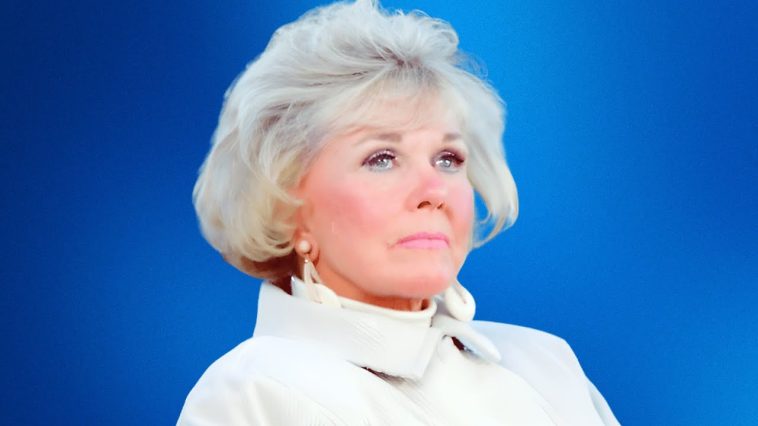Doris Day, a name that resonates with the golden era of Hollywood. She was a celebrated actress and singer whose career spanned over six decades. Known for her performances in films like “Pillow Talk” and “Calamity Jane”. Her hit songs like “Que Sera, Sera,” Day’s talent and charm made her a beloved figure in the entertainment industry. However, her life was not just about the glitz and glamour of Hollywood. It was also marked by personal struggles and complex relationships.
In May 2019, Day passed away at the age of 97, leaving behind a legacy that continues to inspire many. Yet, in a surprising departure from the norm, Day had no funeral or grave marker following her death. This unusual decision isn’t a random choice, but a reflection of Day’s beliefs and the complexities of her personal life. Join us as we investigate reasons behind this decision, exploring the life of Doris Day and the circumstances that led to her unique final wishes.
Life and Career
Doris Day, born Doris Mary Ann Kappelhoff on April 3, 1922, in Cincinnati, Ohio. She starts her journey to stardom at a young age. Her initial dream of becoming a dancer was cut short by a car accident in her teenage years. However, this setback led her to discover her true calling – music. While recovering from her injuries, Day’s singing talent was discovered. By the age of 17, she was touring with the Les Brown Band.
Day’s breakthrough in the music industry came in 1945 with the song “Sentimental Journey”. She quickly became an anthem for World War II troops returning home. Her soothing voice and wholesome image resonated with the public, leading to a successful music career with several hit records.
“Romance On The High Seas”
In the late 1940s, Day transitioned to acting, making her film debut in “Romance on the High Seas.” Her natural charm and talent for comedy quickly made her a popular figure in Hollywood. After two decades, Day starred in a series of successful films, including “Calamity Jane,” “The Man Who Knew Too Much,” and “Pillow Talk”. She received an Academy Award nomination.
Day’s career in Hollywood spanned multiple genres, including musicals, comedies, dramas, and thrillers. She became one of the biggest film stars of the 1950s and 1960s. Embodying the ideal American woman of the era with her intelligent, wholesome, and optimistic on-screen persona.
Day’s contributions to the film and music industry were recognized with numerous awards. Throughout her career, she has received numerous prestigious awards. In 1989, she was honored with the Golden Globe Cecil B. DeMille Award for her outstanding contribution to the movie industry. She was also recognized for her remarkable achievements in other fields. In 2004, she was awarded the Presidential Medal of Freedom. And in 2008, she was presented with the Grammy Lifetime Achievement Award along with the Legend Award from the Society of Singers. In recognition of her outstanding career path, the Los Angeles Film Critics Association honored her with the Career Achievement Award in 2011.
29th Studio Album “My Heart”
Even in her later years, Day continued to make contributions to the music industry. She unveiled her 29th studio album, “My Heart,” in 2011. It included fresh tracks and achieved a Top 10 position in the UK charts. As of 2020, she was among the eight music artists who have been the highest-grossing act at the box-office in the United States four times.
Towards the end of her acting career, Day shifted her focus to animals and co-founded “Actors and Others for Animals”. In 1978, she established the Doris Day Pet Foundation and, after nine years, became a founding member and president of the Doris Day Animal League, a lobbying organization that advocates for laws regulating the treatment of animals.
Personal Struggles and Relationships
Doris Day’s life was not without its share of personal struggles. Despite her sunny on-screen persona, her off-screen life was marked by a series of tumultuous relationships and personal tragedies. Her four marriages were fraught with issues, including domestic violence, infidelity, and financial instability.
Day’s personal life was marked by a series of romantic woes. Her first husband was Al Jorden, a musician. They had a son named Terry, but the marriage didn’t last long and they divorced after two years. She then married George Weidler, but their union was also brief and they separated. Finally, in 1951, she married Martin Melcher, who was not only her husband but also her manager.
They were together until he passed away in 1968. It’s unfortunate that Mrs. Day faced financial difficulties during her third marriage. Her husband’s poor investment choices and association with an unscrupulous lawyer led to significant financial losses after his untimely death. This ultimately led to her bankruptcy and a subsequent nervous breakdown. However, in 1974, she successfully sued the lawyer and received a substantial sum of $22 million, which was a significant victory. Despite this, Mrs. Day faced additional personal challenges, including a short-lived marriage to Barry Comden that ended in divorce in 1981.
Single For The Rest Of Her Life
After her fourth she chose to remain single for the rest of her life. Instead, she devoted her time and energy to animal welfare, founding the Doris Day Animal Foundation.
Day’s relationship with her only child, Terry, was a complex one. Despite the difficulties in their relationship, including Terry’s adoption by Melcher, Day and her son shared a close bond. However, her relationship with her grandson, Ryan Melcher, Terry’s only child, was more complicated. According to Ryan, he was barred from seeing his grandmother during the final years of her life by her manager, Bob Bashara.
In 2004, Doris Day experienced a significant personal tragedy. Her only son, Terry, who had made a name for himself as a successful music producer, passed away after a prolonged fight with skin cancer. This loss, coupled with the estrangement from her grandson, Ryan Melcher, added another layer of sorrow to Day’s personal life. Despite these challenges, Day remained resilient, focusing on her passion for animal welfare and maintaining her private, simple lifestyle until her death in 2019.
Day’s personal struggles extended beyond her relationships. She was a private person who valued her solitude, a trait that became more pronounced in her later years. This preference for privacy, combined with the personal losses she endured, played a significant role in her decision not to have a funeral or grave marker.
The Estrangement from Her Grandson
The estrangement between Doris Day and her only grandson, Ryan Melcher, adds a layer of complexity to her personal life. Ryan, the son of Day’s only child, Terry Melcher, had a relationship with his grandmother that was marked by periods of closeness and long stretches of separation.
Ryan Melcher, now a successful real estate agent, has spoken out about the estrangement, providing a glimpse into the dynamics that led to their separation. According to Ryan, the estrangement was not a result of a falling out between him and his grandmother, but rather the result of interference by Day’s manager, Bob Bashara.
Ryan claims that after his father’s death in 2004, Bashara took over Day’s affairs and cut off communication between Day and her grandson. The last time Ryan spoke to his grandmother was after his father’s death when she invited him to dinner. However, this meeting never took place. Instead, Ryan was intercepted by Bashara, who questioned his motives for wanting to see his grandmother and ultimately prevented the meeting from happening.
Ryan’s attempts to reconnect with his grandmother were thwarted by Bashara, who, according to Ryan, fired the longstanding members of Day’s foundation board and appointed his own family members in their place. Ryan’s efforts to raise awareness about the situation were met with resistance, and he ultimately decided to stop fighting, fearing that his actions might cause stress for his grandmother, whose mental health was reportedly declining.
The estrangement from her grandson was a source of sorrow for Day. Despite her desire to reconnect with Ryan, as revealed by a pen pal of Day’s, the estrangement remained until her death.
Final Years and Death
In her final years, Doris Day chose to retreat from the public eye, living a quiet life in Carmel-by-the-Sea, California. Despite her withdrawal from the entertainment industry, Day remained active in her passion for animal welfare. She founded the Doris Day Animal Foundation, a non-profit organization aimed at helping animals and the people who love them. Her commitment to this cause was a significant part of her life and legacy.
On May 13, 2019, Day passed away at the age of 97. Her passing marked the end of an era, but her legacy lives on through her contributions to music, film, and animal rights advocacy. However, in keeping with her private nature, Day made a surprising decision regarding the arrangements following her death.
According to Day’s friend and manager, Bob Bashara, it was disclosed that Day had made it clear in her will that she did not want any funeral, memorial service, or grave marker. This decision was not made out of fear or negativity, but rather a reflection of Day’s personal beliefs. She did not like death, and she did not like to talk about it. In her view, death was a part of life, and she didn’t see the need for elaborate ceremonies or markers.
Her Final Years
Day’s decision was also influenced by her experiences in her final years. The estrangement from her grandson, Ryan Melcher, and the loss of her only son, Terry, were significant factors in her life. These personal losses, coupled with her preference for privacy, led to her unique final wishes.
In her later years, Day found solace and strength in her pets. She once expressed that during the painful and bleak periods she had endured over the past years, her pets had been a source of joy and strength for her. She discovered that when one is deeply troubled, there are certain comforts and solace that can only be derived from the silent, devoted companionship of pets.
Day’s final years were marked by a sense of resilience and a deep love for her animal companions. She chose not to have a funeral or a grave marker because she was a private person and saw death as a normal part of life. Her legacy, marked by her contributions to film, music, and animal rights, continues to resonate today.
Doris Day’s life showed her strength and her strong beliefs. Despite her fame and success as a Hollywood actress and singer, her personal life was marked by a series of challenges and heartbreaks.
Yet, Day’s story is not one of defeat but of resilience. She faced each challenge with grace and determination, never allowing her personal struggles to overshadow her professional accomplishments or her passion for animal welfare. Her decision not to have a funeral or grave marker was a reflection of her private nature and her pragmatic approach to life and death.
There you have it. It’s now time to hear from you. Let us know what you think about Doris Day’s life and legacy.



